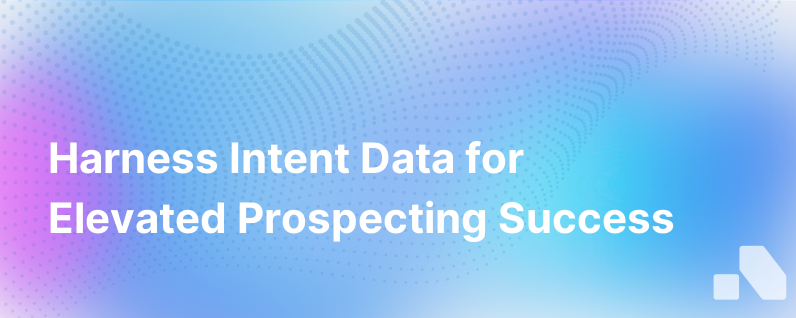
In the ever-evolving landscape of B2B sales, intent data is rapidly becoming the linchpin for high-performing prospecting strategies. Its integration into sales processes has revolutionized the way companies identify, engage, and convert prospects into customers. For businesses looking to refine their prospecting success, leveraging intent data provides an unmissable competitive edge.
But what exactly is intent data, and how can businesses skillfully weave it into their prospecting initiatives to build upon their successes? This article will illuminate the intricacies of intent data and provide actionable insights for businesses to capitalize on its profound potential.
What is Intent Data?
Intent data is digital insights collected on prospective buyers that indicate their potential interest or 'intent' to purchase a product or service. This data can include various user actions, such as content downloads, search engine queries, webinar registrations, and page views on third-party websites. By aggregating and analyzing this behavior, organizations garner a more nuanced and real-time understanding of where a prospect is in their buying journey.
The true value of intent data unfolds in two forms – first-party and third-party intent data. First-party intent data is collected from interactions on your own digital properties, like website visits or content downloads. Conversely, third-party intent data is sourced from monitoring online activities across multiple channels and platforms beyond your direct control, offering a broader view of potential buyer interest.
Why is Intent Data Crucial for Prospecting Success?
Intent data empowers sales teams to discern the ‘ready to buy’ signals emitted by potential prospects. This ability to detect a prospect’s readiness for sales engagement fundamentally transforms the prospecting apparatus from a scattergun approach to a precision-targeted endeavor. With real-time evidence of buyer interest, companies can prioritize and personalize outreach, increase engagement rates, streamline the sales cycle, and ultimately heighten conversion odds.
Here are key reasons why intent data is transformative for prospecting success:
-
Improved lead prioritization: Not all leads are created equal. Intent data helps you identify which prospects are in active buying mode or showing interest in solutions like yours, enabling efficient resource allocation.
-
Enhanced personalization: By understanding what topics or solutions a prospect is exploring, you can tailor your communication with highly relevant content that addresses their specific needs or pain points.
-
Better timing of outreach: Intent data can signal the prime time to engage with a prospect, increasing the likelihood that your outreach aligns with their interest peaks, making it more welcome and impactful.
-
Insights beyond the surface: With intent data, you gain deeper insights into a potential account's broader business activities, challenges, and concerns, allowing for richer and more consultative conversations.
How To Utilize Intent Data in Prospecting
Now, let’s dive into the practical steps to effectively utilize intent data within your prospecting strategies:
1. Integrate Intent Data into CRM and Sales Platforms
To capitalize on the dynamic nature of intent data, integrate it seamlessly into your Customer Relationship Management (CRM) and sales enablement platforms. This ensures that your sales team has real-time, actionable insights at their fingertips.
2. Tailor Outreach with High-Precision Targeting
Use the insights gleaned from intent data to refine your targeting. Deploy personalized messaging that resonates with the prospect’s current interests and challenges. Segment your audience based on intent signals and customize communication accordingly for maximum engagement.
3. Establish a Responsive Engagement Cadence
Design an engagement strategy that reacts agilely to intent signals. If a prospect is displaying heightened interest levels, your engagement cadence should mirror this with more frequent and targeted touches.
4. Enhance Content Strategy Using Buyer Interests
Guide your content marketing strategy using the topics and concerns that intent data reveals. Invest in creating content that addresses the emerging interests and questions your potential buyers have, thereby positioning your brand as a thought leader.
5. Apply Predictive Analytics for Forecasting
Leverage predictive analytics tools to analyze intent data patterns which can forecast future buying behaviors. This empowers sales teams to anticipate needs and engage prospects strategically, often even before they enter the conscious buying phase.
6. Monitor Competitor Engagement Levels
Certain intent data tools can indicate engagement levels with competitors, thus providing an edge in understanding the competitive landscape. Use this knowledge to your advantage to differentiate your offering and highlight unique value propositions.
7. Enrich Account-Based Marketing (ABM) Efforts
Integrating intent data can enhance ABM strategies by providing account-level insights. It helps in crafting hyper-focused campaigns targeted towards accounts showing strong buying signals.
8. Constantly Refine and Iterate
Continually refine your strategies based on the insight provided by the intent data. Test different messages, offers, and timing until you arrive at the most effective engagement model for each prospect segment.
Conclusion
Intent data is the secret weapon that allows astute B2B sales teams to operate with a level of precision and personalization that was virtually impossible before. With these strategies, your prospecting efforts can be informed by data-driven insights that not only optimize your outreach but also augment the buyer’s journey.
B2B organizations determined to build upon their prospecting success must embrace the power of intent data. Its implementation aligns the stars – the right message, the right solution, the right time – for a sales pitch that's nearly irresistible. Harnessing intent data, therefore, isn't just an enhancement to prospecting; it's an evolution.